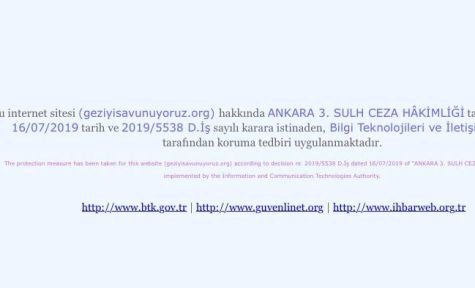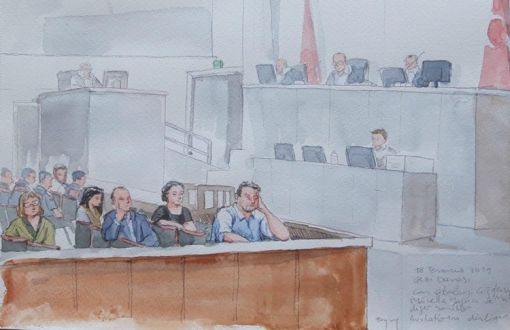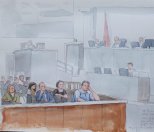* Illustration: Zeynep Özatalay / Court hall in the second hearing of Gezi trial
Click to read the article in Turkish
An access block has been imposed on "geziyisavunuyoruz.org" (We defend Gezi) website that informs the public about the ongoing Gezi trial.
The ban in question has been imposed by the Ankara 3rd Penal Judgeship of Peace. In a message shared on #DefendingGezi Twitter account, it has been stated, "You can ban our website but not our solidarity. We are #DefendingGezi and will continue to do so. #GeziyiSavunuyoruz."
You can ban our website but not our solidarity.
— #DefendingGezi (@defendinggezi) 19 Temmuz 2019
We are #DefendingGezi and will continue to do so.#GeziyiSavunuyoruz pic.twitter.com/Q1femDRWLU
In the message, it is also indicated, "The website geziyisavunuyoruz.org, which publishes updates about the Gezi trial underway in Turkey, has been banned following an order from the Ankara 3rd Penal Court.
"The decision on 16 July to ban the website, online since 20 May 2019, was based on law 5651 which regulates online publications.
"The website contained photographs and videos of Gezi protests back in May and June 2018, as well as a summary of the indictment, court statements by defendants, illustrations from inside the courtroom, schedule of buses to the courthouse, and announcements of public meetings."

Accordingly, the ones who attempt to reach the website through the TTNET Internet service provider in Turkey see a court order which reads:
"The protection measure has been taken for this website (geziyisavunuyoruz.org) according to decision nr. 2019/5538 D.İş dated 16/07/2019 of 'Ankara 3. Sulh Ceza Hakimliği' implemented by the Information and Communication Technologies Authority."
What happened?In raids conducted on November 16, 2018, Prof. Dr. Betül Tanbay, Prof. Dr. Turgut Turhanlı, Anadolu Kültür's Deputy Board Chair Yiğit Ekmekçi, Board Member Ali Hakan Altınay, General Coordinator Asena Günal, film producers Çiğdem Mater and Meltem Aslan, civil society employees Yiğit Aksakoğlu, Filiz Telek, Bora Sarı, Yusuf Cıvır, Ayşegül Güzel, Hande Özhabeş were detained. Hande Özhabeş, Prof. Dr. Turgut Tarhanlı, Asena Günal ile Bora Sarı and Meltem Aslan were released at night after testimonies. Prof. Dr. Betül Tanbay, Yiğit Ekmekçi, Hakan Altınay, Yusuf Cıvır, Ayşegül Güzel and Çiğdem Mater were released on November 17. Yiğit Aksakoğlu, who was doing civil society studies at the Bilgi University, was arrested. Anadolu Kültür Board Chair Osman Kavala was arrested without an indictment November 1, 2017 and March 4, 2019. An 657-page bill of indictment was completed on February 20 and sent to 30th Heavy Penal Court. The indictment charges all the 16 defendants with "attempting to overthrow the government of the Republic of Turkey or preventing it from performing its duties" upon the Turkish Penal Code Article 312/2. The other charges are, damage to property, qualified form of damage to property, Holding or handing over dangerous material, damaging places of worship and cemeteries, violation of the Law No. 6136 on Firearms and Knives Qualified looting (Turkish Penal Code Article 149), qualified bodily injury (Turkish Penal code Article 86), violation of the Law No. 2836 on the Conservation of Cultural and Natural Property. The 16 defendants are alleged to be the "head executives" of the Gezi Park protests are Osman Kavala, Yiğit Aksakoğlu, Ali Hakan Altınay, Mücella Yapıcı, Ayşe Pınar Alabora, Can Dündar, Çiğdem Mater, Gökçe Yılmaz, Handan Meltem Arıkan, Hanzade Hikmet Germiyanoğlu, İnanç Ekmekçi, Mehmet Ali Alabora, Mine Özerden, Can Atalay, Tayfun Kahraman, and Yiğit Ali Ekmekçi. The bill of indictment was accepted by the court on March 4. The first hearing will be held on June 24. While Osman Kavala's application to the European Court of Human Rights (ECtHR) has not been concluded, Yiğit Aksakoğlu's attorneys appealed to the Constitutional Court. |
(TP/SD)












